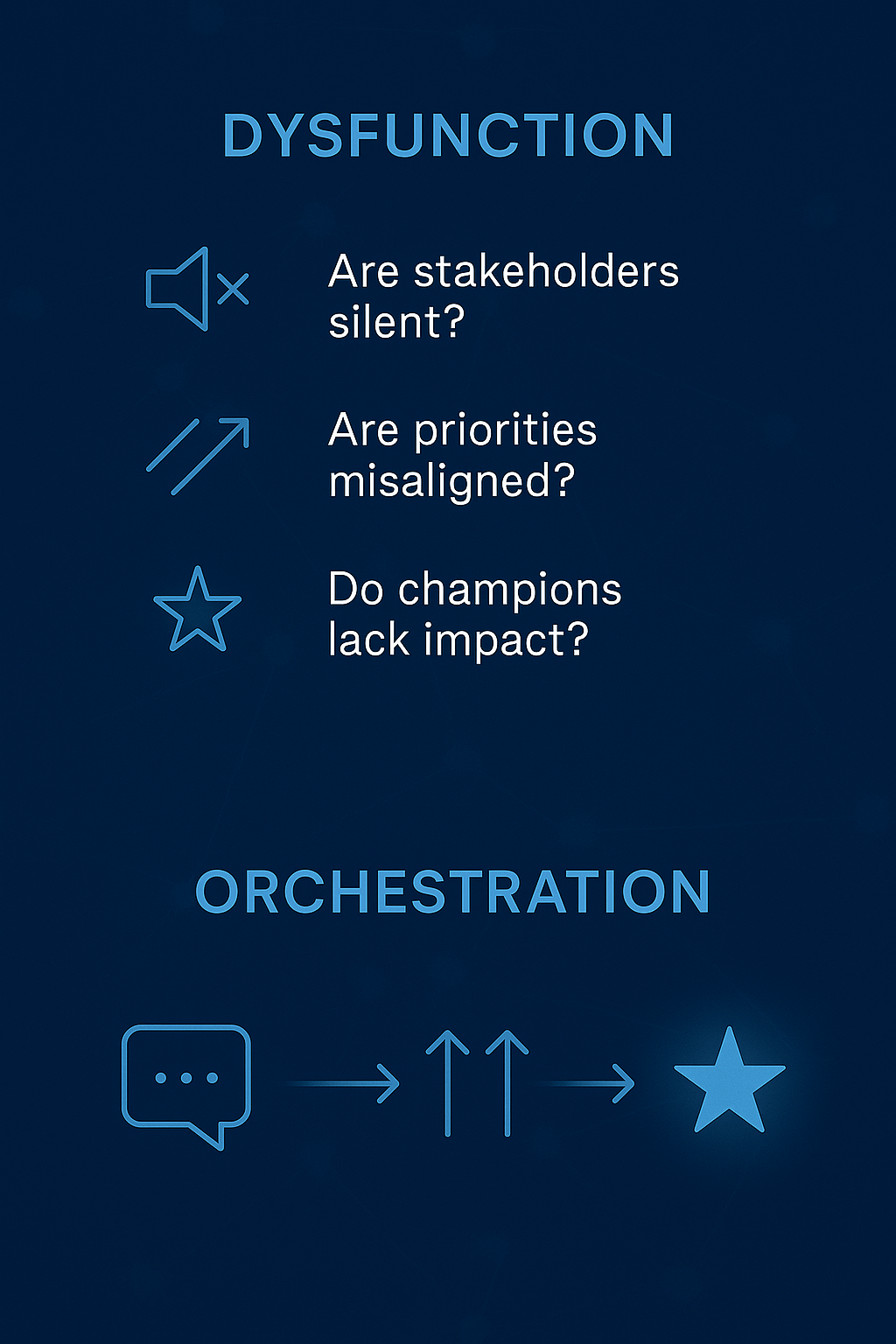Orchestrate Consensus and Buy-In
Guiding the invisible choreography that unfolds in every enterprise.
Why this step matters
Enterprise selling is not a solo act, it’s a political sport.You can have the strongest champion, the clearest ROI, and the perfect fit. But if the room isn’t aligned, the deal won’t move.
Inside the enterprise, support lives in fragments:
One person loves the solution
Another has budget fears
A third is protecting their turf
And the rest? They just want to avoid risk.
This step helps you go from private approval to public momentum.
From silent support to active alignment.
How ESO Approaches It
We don’t chase consensus. We orchestrate convergence.
ESO doesn’t assume buy-in is logical. It treats internal decision-making as a political and emotional sequence, not just a financial one.
Using behavioral signals, stakeholder mapping, and narrative layering, ESO helps you:
Identify when alignment is real, and when it’s performative
Sequence conversations to build pressure in the right direction
Map influence chains and anticipate resistance points
Equip champions with tailored scripts and silent framing cues
Design the internal story, so it’s their idea, not yours
This is where sales becomes orchestration:
Reading the room, setting the tempo, and conducting the people who move the decision.
Indicators to Watch For
You’re getting yeses, but no progress.
Everyone agrees in meetings — but nothing moves afterward
Your champion keeps saying, “Let me circle back” — again and again
Each stakeholder brings up different objections each time
You sense an invisible blocker — but can’t name them
Supporters change their tone in group settings
Each of these is a signal that internal alignment isn’t real, it’s surface-level.
What You’ll Learn to Do
Turning internal politics into forward motion.
Enterprise deals get stuck not because people say “no”, but because they don’t say anything at all.
Consensus isn’t about agreement. It’s about motion.
This stage teaches you to:
Sequence conversations in a way that builds internal momentum — not resistance
Turn champions into internal orchestrators, not just cheerleaders
Align conflicting priorities around a shared decision frame
Preempt silent blockers before they surface in group meetings
Equip stakeholders with internal language and logic they can own, even when you’re not in the room
Orchestrating consensus means influencing the decision before it happens, not reacting after it stalls.
Is your internal buy-in real — or just polite?
Before deals stall, they whisper. Silent blockers. Champions under pressure. Fragmented signals. This quick self-check helps you spot the signs before it’s too late:
Key Questions to Ask
1. Do you know how decisions are actually made — or just who signs the contract? → Many sellers confuse authority with influence.
2. Are your champions shaping the internal story — or just relaying it? → If they’re asking, not telling, you’re not orchestrating.
3. Do objections keep shifting — or disappearing completely? → Inconsistent resistance is a sign of political undercurrents.
4. Do supporters act differently in group settings? → That’s not consensus. That’s conformity.
5. Have you mapped the emotional risk for each stakeholder? → Logic alone doesn’t drive alignment — personal safety does.
What to Look For in Your Own Accounts
Champions who need to “check with others” too often
Group meetings where progress stalls despite individual support
A growing list of “new voices” entering late in the cycle
Stakeholders who go quiet when you push for action
Evaluate Your Deal Environment
Explore the next step
Learn the Full Methodology
Discover the complete ESO framework in the book — practical strategies, real-world insights, and tools to win complex enterprise deals.
Apply ESO directly to your accounts
Work with us to decode your decision networks, align stakeholders, and accelerate your most important deals with a tailored ESO strategy.
Equip your team to master complex deals
Give your team the tools and frameworks to navigate enterprise complexity, build consensus, and close high-value deals with confidence.





